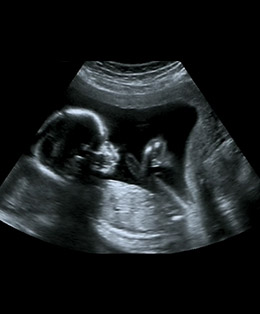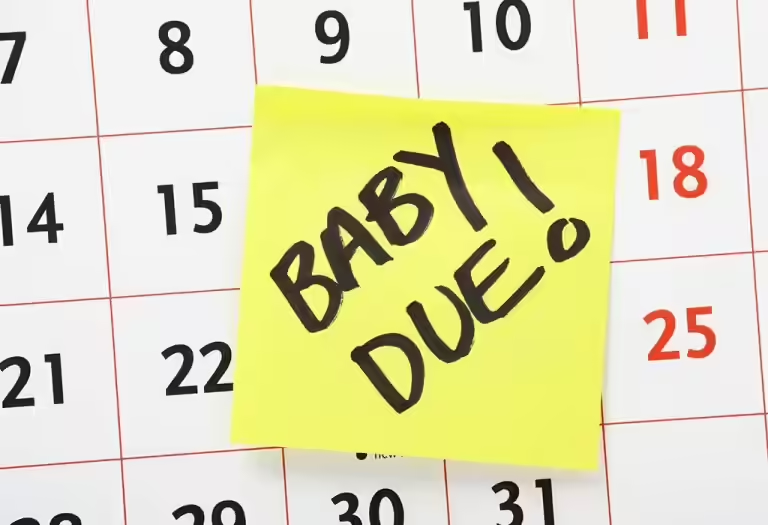Pregnancy Due Date Calculator
Want to know when your baby is due? Try our user-friendly due date calculator tool to find your due date based on the last menstrual period (LMP) or conception date.
Last Period

dd/mm/yyyy

28 Days


Medically Reviewed By:
Dr. Sabiha Anjum(Gynecologist/Obstetrician)
What Is a Due Date Calculator?
A pregnancy due date calculator is a software tool that helps generate the estimated due date of delivery (EDD), i.e. the estimated time when you will give birth. Knowing the due date helps healthcare experts and would-be parents prepare for the delivery process and welcome the baby without any hindrances. Nevertheless, it is important to note that the due date calculator, or a pregnancy estimator, gives the ‘estimated’ due date. That means there is no deadline or fixed date; the due date can change by one to two days.
Read More
How to Calculate a Pregnancy Due Date?
A delivery due date calculator estimates the delivery date of a pregnant woman based on the conception date, last menstrual cycle, last ultrasound, and IVF transfer date. Let’s explore them one by one.
1. First Day of Last Period Calculating the due date on the pregnancy calculator using the first day of your last menstrual period (LMP) is the most preferred way of determining the estimated due date. Since most pregnancies last around 38 to 40 weeks from conception, the due date is calculated by counting 280 days or 40 weeks from the first day of your last period. You can add the first day of your last period (LMP) and the average length of the cycle on our Pregnancy Due Date Predictor and get the probable date of delivery.
2. Conception Date If you have been dedicatedly tracking your ovulation cycle and symptoms, you might be able to generate the baby’s due date using your conception date. From the conception date, the tool will add 266 days to let you know how far along you are to meet your baby. The conception date method gives the best possible result when you are sure of your conception date.
3. Ultrasound Scan Don’t worry if you have forgotten your last menstrual cycle date, not sure when the ovulation occurred or when the conception happened. You can still get an estimated due date of your pregnancy based on the date of your early ultrasound. Although not proven, ultrasound scan method can sometime give more accurate results than the LMP or conception date method.
4. IVF Transfer Date Calculating the due date using the in vitro fertilisation (IVF) transfer date is also possible. Generally, embryo transfers happen either three days or five days after the egg retrieval and fertilisation. So, if it is a three-day transfer, you can count 263 days from the transfer days to get the due date, and if it is a five-day transfer, you can count 261 days from the transfer date.
1. First Day of Last Period Calculating the due date on the pregnancy calculator using the first day of your last menstrual period (LMP) is the most preferred way of determining the estimated due date. Since most pregnancies last around 38 to 40 weeks from conception, the due date is calculated by counting 280 days or 40 weeks from the first day of your last period. You can add the first day of your last period (LMP) and the average length of the cycle on our Pregnancy Due Date Predictor and get the probable date of delivery.
2. Conception Date If you have been dedicatedly tracking your ovulation cycle and symptoms, you might be able to generate the baby’s due date using your conception date. From the conception date, the tool will add 266 days to let you know how far along you are to meet your baby. The conception date method gives the best possible result when you are sure of your conception date.
3. Ultrasound Scan Don’t worry if you have forgotten your last menstrual cycle date, not sure when the ovulation occurred or when the conception happened. You can still get an estimated due date of your pregnancy based on the date of your early ultrasound. Although not proven, ultrasound scan method can sometime give more accurate results than the LMP or conception date method.
4. IVF Transfer Date Calculating the due date using the in vitro fertilisation (IVF) transfer date is also possible. Generally, embryo transfers happen either three days or five days after the egg retrieval and fertilisation. So, if it is a three-day transfer, you can count 263 days from the transfer days to get the due date, and if it is a five-day transfer, you can count 261 days from the transfer date.
Read More
Other Methods of Estimating Due Date
There are several other ways of determining an estimated due date at your prenatal checkups.
1. During prenatal checkups, the healthcare provider checks the fundal height—the distance from your pubic bone to the top of your uterus. This will be beneficial in verifying your due date.
2. Pregnancy milestones, such as the first time your baby's heartbeat is detected (usually around week 9 or 10) and when you first feel the fetal movement (typically between 18 and 22 weeks), can help pinpoint your due date.
3. The size of your uterus, observed during the initial internal pregnancy exam, can also assist in determining your estimated due date (EDD).
1. During prenatal checkups, the healthcare provider checks the fundal height—the distance from your pubic bone to the top of your uterus. This will be beneficial in verifying your due date.
2. Pregnancy milestones, such as the first time your baby's heartbeat is detected (usually around week 9 or 10) and when you first feel the fetal movement (typically between 18 and 22 weeks), can help pinpoint your due date.
3. The size of your uterus, observed during the initial internal pregnancy exam, can also assist in determining your estimated due date (EDD).
Read More
How Soon Can I Take a Pregnancy Test?
Missed periods, nausea, vomiting, and tender breasts are some of the earliest signs of pregnancy (1). If you are sure you have missed your menstruation cycle, you can then take a pregnancy test either at home with a pregnancy kit or by visiting the doctor for a blood test to confirm your pregnancy. NHS and the American Pregnancy Association suggest waiting out the first day of your missed period before you take a pregnancy test (2) (3). You can also use an online pregnancy test calculator to understand when to take the test. If you remember details about your last period, you can get a possible estimate of your pregnancy due date by using the first day of your last period.
Read More
What Is Gestational Age?
Gestational age, in simple terms, is the time period between conception and childbirth. It is a common term used to describe pregnancy or how far along the pregnancy is (4). Gestational age is calculated from the first day of a woman’s last period (LMP) to the current date and is expressed in days or weeks. A normal and healthy gestation age ranges from 38 to 42 weeks (5). You can determine gestational age with the help of a pregnancy month calculator.
Read More
What Is Fetal Age?
Fetal age or conceptional age denotes the length of pregnancy from the time of conception.
How Accurate Is the Due Date?
As mentioned above, pregnancy due dates are fairly accurate. But we must remember they are, at last, an estimate, not a guarantee. Due dates, too, can be influenced by natural delays.
Can My Due Date Change?
Yes, it is possible for your due date to change as your pregnancy progresses. There is no need to worry about the change as there could be several factors in the play. It might be changes in your menstrual cycle, like irregular periods, or that your first ultrasound takes place in the second trimester. There could be a change in the due date if your fundal height is not as expected or if the alpha-fetoprotein (AFP) levels are not in the normal range. If you have any doubt regarding the change in the due date, consult your doctor without any hesitation.
Read More
Can I Plan My Due Date?
Yes, it is possible to plan your estimated due date. Many couples plan to give birth on a particular festival, while some try to avoid the chance of giving birth in the months of harsh weather. Whatever, the reason is, it is very well possible to plan your due date by timing your conceiving well. But it is important to remember that even if you can time your conceiving date perfectly with an ovulation tracker, the likelihood of delivering the baby on the exact date is debatable.
Read More
Will My Baby Be Born on Due Date?
The likelihood of delivering on the exact due date is 1 in 20. A pregnancy due date is an ‘estimate’ that helps doctors and pregnant mothers be aware of the delivery so they can prepare in advance. So, there is a range of two weeks before or after of the due date in which women are expected to deliver the baby.
Read More
Frequently Asked Questions
Q. How many weeks pregnant am I?


A. To learn how far along you are in your pregnancy or how many weeks pregnant you are, you can use a pregnancy days calculator. Pregnancy usually ranges from 38 to 42 weeks. Calculating the gestational age can be tricky because your baby's age is two weeks less than the pregnancy start date.
Q. Why is the due date calculated from the period?


Q. Is the due date based on ovulation?


A. No, the due date is not based on ovulation. It is based on the date of conception.
Q. How do you calculate pregnancy weeks from the due date?


A. Pregnancies typically last about 38 to 40 weeks. To estimate your conception date, note the start of your last menstrual period (LMP) and count 40 weeks (280 days) from that date.
Q. Can your due date change?


A. Yes, the pregnancy due date can change based on your ultrasound scans and last menstrual cycle. It is common for mothers to be sure of their pregnancy and due date calculator is one such tool that simplifies the pregnancy journey. While it is a beneficial tool, it is essential to remember that it is just an estimate, not a guarantee. Be alert, keep yourself informed about different pregnancy nuances, stay in touch with your doctor, and enjoy the pregnancy journey while it lasts.
Other Pregnancy Tools and Trackers
Disclaimer :
Firstcry Parenting - Due Date Calculator determines the probable due date. Only your physician/Doctor can accurately determine your due date based on his/her knowledge of your medical history. All the calculations are tentative and Firstcry won’t be responsible for any related consequences.
References :
1. Pregnancy - signs and symptoms; Better Health Channel;
2. Doing a pregnancy test; NHS;
3. Pregnancy Due Date Calculator; American Pregnancy Association;
4. Gestational Age vs Fetal Development – What is the Difference?; Kinsey Institiute Research & Institue News;
5. Gestational age; MedlinePlus;
6. Due date calculator; NHS;





.svg)
.svg)
.png)



















